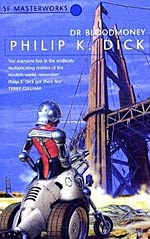
![]() charlesdee
charlesdee
8/1/2011
![]()
Thank God for editors. PKD proposed two titles for this post-nuclear apocalypse novel: In Earth's Diurnal Course and A Terran Odyssey. Donald Wolheim at Ace come up with Dr. Bloodmoney, or How We Got Along After the Bomb. Wolheim's title might have been a flagrant effort to cash in on Stanley Kubrick's Dr. Strangelove, but at least it did not include the word "diurnal," and it did give some hint to what the book is about.
This is one of the dozen or so novels PKD wrote in 1963/64, but due to the build up of back inventory, it was not published until 1965. It is surprisingly idyllic given the subject matter and the amount of amphetamines the author was ingesting at the time. There had been two post-nuclear bestsellers in the late 1950's, Pat Frank's Alas, Babylon -- still I understand a favorite for middle school book reports -- and Neville Shute's On the Beach, which as both a novel and film seemed determined to prove just how tedious it would be to wait for death from radiation poisoning. PKD gets in a sly dig at the latter in his own novel. Walt Dangerfield, a would-be Martian colonist stuck in eternal earth orbit, broadcasts music and readings for survivors on Earth. One of their most requested songs is Waltzing Matilda, the traditional Australian ballad that served as theme music to On the Beach.
As is his habit, PKD has little interest in what might be the actual effects of an atomic war. His characters go about their lives in Marin County pretty much as they would pre-holocaust. They hold town meetings, they have affairs, they gather mushrooms. They have a resident psychiatrist. They mostly walk or ride bicycles rather than use wood-burning or horse-drawn automobiles. As a community they are insular and suspicious of outsiders, but they should be since jealous outsiders might want to "nap" some vestiges of the good life they maintain. They are also blessed with the best handyman around, Hoppy Harrington, a "phoce," a diminutive for phocomel, those with a congenital deformity that produces flipper-like arms and legs. But Hoppy more than makes up for his shortcomings with his mobile machine and some very special powers. In an early scene, he fixes a turntable by healing it. He gets more dangerous later on.
I just finished this book yesterday, and I am trying to remember if it has a plot. I don't think it does. It really is a sort of pastoral -- with mutants. Rats have learned to play the nose-flute. Cats have developed their own secret language, and dogs make a pitiful attempt at speaking English. By the novel's end, mail routes are opening again, and some of the characters feel the lure of the big city. They plan to go into the cigarette manufacturing business.
http://www.potatoweather.blogspot.com